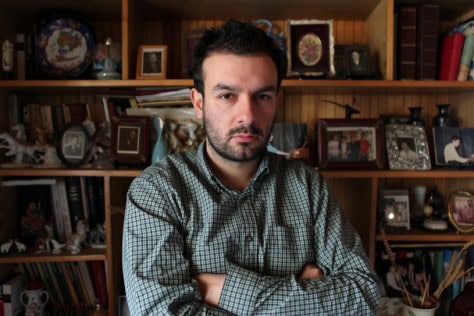“There’s nothing more soul-crushing than watching hardcore 70s porn,” says Justin Theroux. “It’s so much realer than the sort of shaved beaver glam porn we get now—it’s a fucking sweaty, hairy mess, and we had about five days in the editing room where our souls were eaten alive watching porn after porn after porn, trying to find the right scene.” Don’t get the wrong idea here—Theroux’s not opening up as a closeted pervert, he’s simply describing the vetting process involved in picking the opening sequence to Dedication, his feature-length directorial debut. It stars Billy Crudup as a misanthropic, vaguely obsessive-compulsive antihero who’s an illustrator for a children’s book series about a talking beaver named Marty, with Mandy Moore as Crudup’s love interest, and—
…Actually, let’s take a long step back.
Reason #121 why Justin Theroux is on the cover of this issue: Though he once got kicked out of Catholic school for smoking cigarettes, he’s now playing a long-haired, badly mustached “Latin Lover Jesus” in The Ten.
Taking the aerial view of 35-year-old Theroux’s career thus far is a slightly confusing task—his resume jumps from dancefloor acrobatics in Zoolander (and The Baxter) to Sex In The City and Six Feet Under roles, a lead in Lynch’s Mulholland Dr., a supporting spot in Miami Vice, not to mention a subtly moving PETA commercial in which he chills on the couch with his deaf pit bull. Despite being an actor, he does not live in Los Angeles, but rather within spitting distance of Washington Square Park, in a lovely apartment clotted with books, posters and memorabilia (including a gigantic steel ‘S’ that hangs on the wall, salvaged from the old Firestone tire factory in Brooklyn).
The required preamble of biographical details for Mr. Theroux, in a dense nutshell: born in Washington, D.C., weaned on the Fort Reno/Fugazi/post-punk scene, he’s kicked out of a few schools for, among other things, “moonshining a nun, as the nun called it”; he leaves to attend Buxton in Williamstown, MA, a “kind of chop wood, carry water place founded in deep socialist beliefs that kids can maintain the school”; after that it’s a Drama/Visual Arts degree at Vermont’s Bennington College, along with some time spent in Beijing, where he learns enough Chinese to get by “pretty damn good at the time.” Theroux moves to New York City where he lives across the street from CBGBs, slings drinks at a spot called Von Bar and pays the bills with random art commissions and mural work. Proving that it’s called “acting” for a reason, the straight, American’s first major role in his early 20s is in the play Hide Your Love Away, about Brian Epstein, homosexual manager of The Beatles. “I played this sort of teddy boy, rough street kid who was Brian’s lover,” Theroux explains. “That became my New York calling card. Is he gay? Is he English? I can play him on Broadway!” (Case in point: Justin Theroux still “treads the boards,” as the Brits call it. His last part was in Behold the Sons of Ulster Marching Toward the Somme at Lincoln Center, where he played “an English gay guy…cuz that’s what I do.”)
Since then he’s dabbled in everything from sitcoms to music videos. It’s clear that he still has a special place in his heart for the time he spent on cop drama The District. “That was my big foray into episodic network television, which made me want to throw a noose around my neck,” he says. “It’s a formula, a never-ending bad story, and it becomes your life. It’s a cheese factory.” Despite signing a contract that could have snared him in syndication for seven long years, Theroux convinced the producers that it’d be better (and cheaper) if he was given back his freedom. “We were a Saturday night show with a big Midwest following. I’ve never been recognized for it, except when I’m at like a hub in Cincinnati on my way to somewhere else. Post-middle-aged women, sort of geriatric women: Aren’t you the fella from The District? Yup. I did that.” While Theroux’s donated time to other shows like Six Feet Under and Sex in the City, it’s pretty obvious that his future isn’t in cable. “I like doing a season,” he explains. “Or six episodes. Or two episodes is even better. I don’t want a lot of episodic television—I want the story to have a beginning, a middle and an end.”
REASON #219: He’s honest enough to admit, two hours through his first full screening of INLAND EMPIRE, that “fuck…I think you kinda lost me there, Dave.” (He changed his mind soon after).
Laura Dern’s character in David Lynch’s latest meta-epic says it best: “I don’t know what happened first, and it’s kinda laid a mindfuck on me.” INLAND EMPIRE doesn’t have patience for the typical parameters of cinema: chronological plot, denouement, personal catharsis and so on. Even the basic rudiments, things like “characters who refrain from changing their identity completely from one scene to another,” tend to go by the wayside. This is, of course, Lynch’s signature, and it’s a convoluted recipe that Justin Theroux has been a part of since his turn as Adam Kesher in Mulholland Drive. While his screen time is limited in INLAND EMPIRE—Lynch is obviously obsessed with Dern, focusing on her open-mouthed “what the fuck” stare for the bulk of the film’s three hours—Theroux makes the most of his role as a Hollywood Lothario with leather jacket and slicked back hair. By the time EMPIRE’s flashy credits sequence begins, you’re left wishing that, among the film’s talking rabbits and murderous Polacks, Theroux had been given more room to breath. (One gets the same sensation watching him in Miami Vice—as he lurks fairly silent in the wings for most of the film, you wish he’d just shoot Colin Farrell and take over. For a little while, at least.)
“Watching [Lynch’s] films is the difference between a Britney Spears album and listening to John Coltrane,” Theroux surmises. “When you put on a Coltrane record, or Miles Davis or Crass, the expectation is different. There’s always going to be people that go, that’s just a whole bunch of bullshit strung together…but that’s kind of like, Miles Davis is just a whole bunch of trumpet bullshit. If you go in being sure there’s going to be a plotline you have to follow, it becomes a frustrating experience—whereas if you pretend you’re at the MOMA, it’s a much more fulfilling thing. He makes images that stick.”
REASON #1,119: His brilliant directorial debut makes you want be young and in love and running around a fantasy New York where Deerhoof, Cat Power and Joanna Newsom play 24/7.
So to return to that 70s porn—Theroux opens Dedication with it, a brief slice of unexpected, smirky smut viewed by Henry (Billy Crudup) and Rudy (Tom Wilkinson, of Eternal Sunshine and In The Bedroom). From there the film is a completely charming and fairly conventional love story, doubly unexpected considering Theroux started preproduction around the time he wrapped Lynch’s 3-hour mindfuck. Dedication is full of insta-classic lines (“That’s why Marty the fucking beaver doesn’t have a fucking girlfriend,” being one of them). It includes the best under-five-minute Amy Sedaris cameo of all time. It boasts Martin Freeman (lovable Tim from BBC’s The Office) as a smarmy British prick. It’ll make you respect Mandy Moore as an actress—and you won’t be ashamed to admit it, either (Theroux says that when she’s “still, she has a very Brigitte Bardot kind of beauty”).
Theroux pulled Dedication together for 1.5 million dollars, a fairly paltry sum in today’s Hollywood. “It’s so hard to make an independent movie,” he says. “You’re begging these people to do it—everyone in the movie got paid fuckin’ jerk. To get someone like Tom Wilkinson to leave London and sit in a cold fuckin’ trailer with a wet pretzel on the Kraft service table is hard to do. It becomes a labor of love.” Having previous credentials didn’t translate into smooth sailing, either, since Theroux still had to fight with producers who wanted to push Dedication into romantic comedy territory. “Anytime you become a slashie—I’m an actor, but I’m directing—you have the chips stacked against you. You have to prove yourself extra. There’s this misconception that you sort of walk amongst your friends, like picking out a kickball team, and cast it that way.”
Dedication’s script comes courtesy of first-timer David Bromberg. Deerhoof contributed a few herky-jerky anthems to the soundtrack, and also recorded original pieces for the film—Theroux is a long-time fan. (“All anyone needs to know is that they are the best band the universe ever has and will produce, and we should all pray and hope an all-knowing God doesn’t take them back anytime soon.”) “Their music mirrors [Henry’s] kind of obsessive, disjointed logic,” he says.
The heart of the film is New York itself, a romanticized version of a particular slice of the city’s past and present that Theroux admits is based on his fledgling impressions as a new arrival in the 1990s. Crudup walks and broods over the red-gated Williamsburg Bridge and down “the last well-graffitied street corner on Spring and Elizabeth” in Soho. Many of Dedication’s most pivotal scenes were shot at the Unisphere, a quasi-desolate spot in Queens that played host to a vision of the urban tomorrow for the 1964/1965 World’s Fair. “I knew the Unisphere from the famous Beastie Boys shot on the inside of License to Ill,” he explains. “[It was] laid out at this fake city, this ‘city of the future!’ It’s all in total disrepair now, wonderfully. You walk around it, no one’s there. Restaurants, observation decks…abandoned and doing nothing.”
While he’s spent significant time in Los Angeles, Theroux seems wed to the city where he first made his mark. “New York is a living, breathing, much faster organism, and it changes non-stop—sometimes for the better, sometimes for the worse, but there’s a constant energy,” he says. “It’s all slammed onto an 8 by 3 piece of sheetrock. It’s the only city in the world where a person from the city will wear a tourist’s shirt and not think twice about it. Without sounding pretentious, you end up having a broader experience because you’re hanging out with musicians and painters and artists and dancers and poets and all the things that make New York wonderful. L.A. is just a company town—everyone works one of the fingers on the arm of the industry. I’m definitely out of the loop, but it’s a preferable loop. I don’t want to go to discos or anything like that.”
Reason #19,191: He cites Wonder Showzen and Stanley Kubrick as being equally inspirational. If he was leaving on a trip, he’d bring Minute Men, Big Black, Minor Threat…along with Oscar Wilde and Edgar Allen Poe.
Despite the banal propensity for magazine features to describe how their celebrity subjects are totally normal, sincere, likable and genuine, it’s impossible to avoid saying that Justin Theroux is totally normal, sincere, likable and genuine. Really. He also makes damn good espresso, uses creatively scornful phrases like “nouveau-dicks” and seems relieved and excited to know that an Otherwise Insignificant Journalist enjoyed his debut feature.
“So much of my last five months has been about positioning my film in the birthing canal of festivals and all the rest of it,” he explains, describing the delicate balancing act of selling and promoting an indie flick. “It’s about sort of dry-humping your public in a way that doesn’t make people think you’re going to be a great lover—but you want to make sure [the film] gets the reception it needs and deserves.”
 Q&A with Larry Gus
Q&A with Larry Gus We Own the Night: The Edison
We Own the Night: The Edison